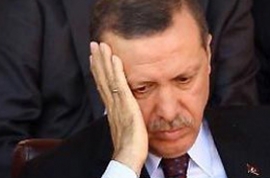Turkey Special: Ankara is Overtaken By Events in Syria's Kurdistan
 President Recep Tayyip ErdoganLast Wednesday, Turkish Prime Minister Recep Tayyip Erdogan, accompanied by his Foreign Minister Ahmet Davutoglu and Defense Minister Ismet Yilmaz, paid an official visit to Moscow. During the meeting, details emerged of the bomb in Damascus, killing four high-ranking officials of the Assad regime.
President Recep Tayyip ErdoganLast Wednesday, Turkish Prime Minister Recep Tayyip Erdogan, accompanied by his Foreign Minister Ahmet Davutoglu and Defense Minister Ismet Yilmaz, paid an official visit to Moscow. During the meeting, details emerged of the bomb in Damascus, killing four high-ranking officials of the Assad regime.
The Ankara delegation was seeking a Syrian transitional government willing to cooperate with Moscow, albeit one without President Assad. This would balance Turkey's post-Assad relationship with Russia with Ankara's interaction with Western countries. At the same time, Erdogan was seeking Moscow’s guarantees on the limits of what Kurds could obtain in the "new" Syria.
At the end of the meeting, Erdogan did not mention Syria at all, preferring to underline the significance of bilateral economic ties. Moscow reciprocated: while the Turkish side was praising the bilateral trade that has increased to $35 billion; the Russians were saying that there were no obstacle to increase this volume to $100 billion in the near future.
However, as soon as Erdogan returned home, he emphasised the “importance of Syria’s territorial unity” as an issue on which Moscow and Ankara see eye-to-eye. That message was aimed not as much at the situation in Damascus as it was at Kurdish areas of the country.
Massoud Barzani, the President of the Iraqi Kurdistan Regional Government, has been trying to unite Syrian Kurds through the Hewlit Agreement. While this has been welcomed by the US, that has opened the space in Turkey for the pro-Kurdish Peace and Democracy Party (BDP) to underscore the importance of peace --- a peace achieved only through freedom for Abdullah Ocalan, the imprisoned leader of the Kurdish separatists PKK.
The initiative was not welcomed by the ruling AKP as the Minister of Interior Idris Naim Sahin was the first person who reacted harshly and called BDP’s deputies “miserables” who “serve a cursed platform that does not promise more than blood, hatred, tears and death”. The subsequent meeting in Moscow was thus a clear warning to Barzani to play his cards carefullly.
But, as soon as the smoke cleared over the Damascus bomb, Ankara found it was confronting a new situation in Syrian Kurdistan. In the northwest of the country, Kurds were taking Kobani, Afrin, and Amude and they were fighting regime forces in Derik and the biggest Kurdish city, Qamishli. The statement in April of the BDP’s co-chair Selahattin Demirtas resonated: “If Iraq is divided, an independent Kurdistan will occur. An autonomous Kurdistan region could occur in Syria. Iran has already a Kurdistan region. In this case, from Igdir to Hatay, Turkey’s all southern borders will be Kurdistan.”
The Erdogan Government finds itself between the interests of --- and thus its relationship with --- Moscow and Washington amid this rapidly-changing environment. It must now consider that the Kurdish national movement has expanded, amid the momentum of the "Arab Spring" and the imminent victory of Syrian Kurds, who will be demanding --- and may gain --- autonomy over most of their affairs.
To ease the pressure, Ankara could accelerate "democratisation" in Turkey and lower its guard against the BDP. However, that will not be easy. Recent military operations, arrests of leading Kurdish activists, hundreds of detentions, and threats against pro-Kurdish legislators have set a high wall against a possible rapprochement.
When asked whether there would be a cease-fire during Ramadan, the PKK’s deputy leader, Murat Karayilan, said that it was not on their agenda. In addition to the legal and "security" barriers raised by Ankara, Karayilan cited the government’s silence over the killings of 34 civilians by Turkish jets in Uludere last December.
The Moscow trip was supposed to resolve the Erdogan Government's position, both over Syria and over its domestic affairs. Five days later, it has become history, one that offers no resolution for the emerging difficulties for the Prime Minister and his party.
 AKP,
AKP,  Ahmet Davutoğlu,
Ahmet Davutoğlu,  BDP,
BDP,  KCK,
KCK,  Kurdistan,
Kurdistan,  Murat Karayilan,
Murat Karayilan,  PKK,
PKK,  Recep Tayyip Erdoğan,
Recep Tayyip Erdoğan,  Russia,
Russia,  Syria,
Syria,  Turkey,
Turkey,  iIsmet Yildiz
iIsmet Yildiz 
Reader Comments